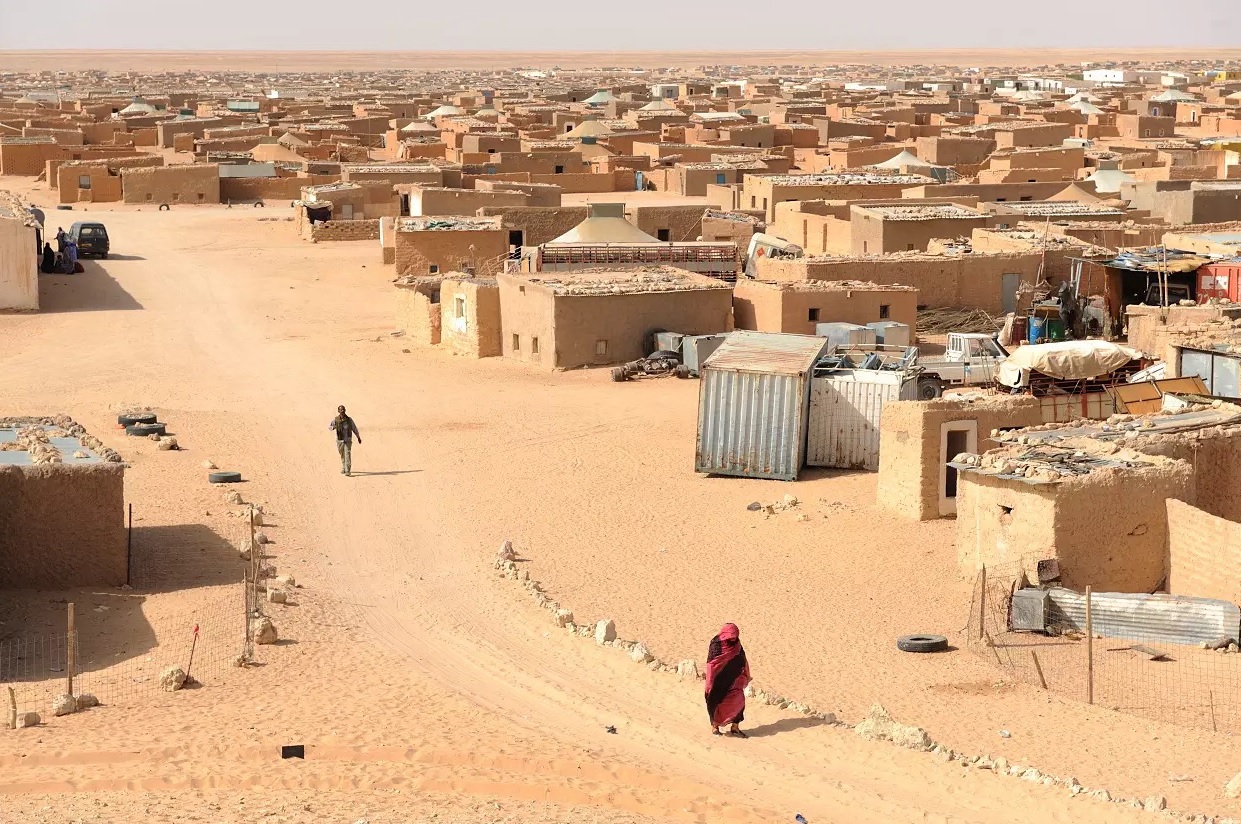
Taking a break from her daily chores, Mariem Mohamed Boujemaa – a 69-year-old Sahrawi refugee living in Boujdour Camp in Algeria’s Tindouf province – would often pause to watch her young grandchildren playing among the family’s sheep and goats in their dusty, wire-fenced enclosure, and feel a deep connection to her own past.
“Breeding sheep and goats for my family is something inherited from one generation to the next,” Mariem explained. “The Sahrawis are known for raising livestock. If a family has four or five goats, they have an endless source of milk for the children and the elderly.”
Mariem reconnected with the tradition and began raising her own livestock around 10 years ago, after her divorce left her struggling to make ends meet. “I felt that I had to do something to face the increasing costs and responsibility of looking after my family,” she said. “We sell one or two goats to have money to cover our daily needs.”
Boujdour is one of five camps established in the remote desert region of south-western Algeria since 1975 to shelter Sahrawi refugees who fled the violence of the Western Sahara War. For those that can afford to raise livestock, the milk and meat they provide helps to supplement the basic monthly food rations that refugees in the camps receive.
“The loss was financial and emotional.”
But earlier this year, just as the camps were being locked down in response to the COVID-19 pandemic, resulting in many refugees losing their jobs and other sources of income, another disease was wreaking devastation on the vulnerable refugee population.
A pulmonary epidemic affecting livestock has resulted in the death of over 1,700 sheep and goats in the camps this year, including all ten of Mariem’s animals. “The sheep got sick after they were infected by the goat. I called the vet who gave them some injections, but even with the treatment they all died.”
Besides the financial blow, she said the young members of her family had found it difficult to comprehend what had happened.
“The children felt sad for the loss,” Mariem said. “They didn’t understand why all the sheep and goats were gone at the same time. The loss was financial and emotional for the family.”
Some of the families that lost their animals had received them only recently as part of a programme funded by UNHCR, the UN Refugee Agency, targeting some of the most vulnerable refugees in the camps.
“Most… who were working lost their daily wages.”
With over 50 per cent of women of reproductive age and children in the camps suffering from anaemia, and high rates of malnutrition (7.6 per cent) and stunting (28 per cent), UNHCR in collaboration with its partner the Algerian Red Crescent provided goats to 263 families suffering from malnutrition, especially those with pregnant and lactating women.
One of the beneficiaries was Dida El Kouri, a mother of nine who relied on the milk to supplement her own diet as well as that of her elderly parents.
“I was planning to benefit also from their meat, but unfortunately we didn’t reach that stage as we lost them [at the same time as] the COVID-19 pandemic,” Dida said. She added that the lockdown measures had had a negative impact on both the finances and mental health of refugees in the camp.
“Most of the youth and the men who were working lost their daily wages as they can’t go anywhere and can’t do any work,” she said. “The children are so bored and depressed from staying inside the house all the time.”
Another recipient of the scheme, 39-year-old Lehdia Aoubaid El Bachir, was grateful as a breastfeeding mother for the improvement in her nutrition, and was “heartbroken” when she lost both of her animals to the livestock disease.
Lehdia described herself as an animal-lover and recalled accompanying her mother as a child to feed and play with their family’s sheep and goats. Having her own sheep had been a source of comfort, and she considered the animals part of the family.
“I felt their love each time I went to feed them or check on them. I felt responsible for them and for their health and nutrition,” she explained
With no other income to fall back on, the epidemic has left many families in the camp more reliant than ever on humanitarian aid, Lehdia said. But with lockdown restrictions now finally being eased – with travel between the camps and to and from Tindouf town possible since June – she hopes their situation will improve.
“The loss has been difficult,” Lehdia said. “We are waiting until the livestock epidemic finishes and then we will see how we can find support to obtain some sheep to go back to raising livestock again.”
SOURCE: UNHCR
By Russell Fraser and Yamina Djoudi